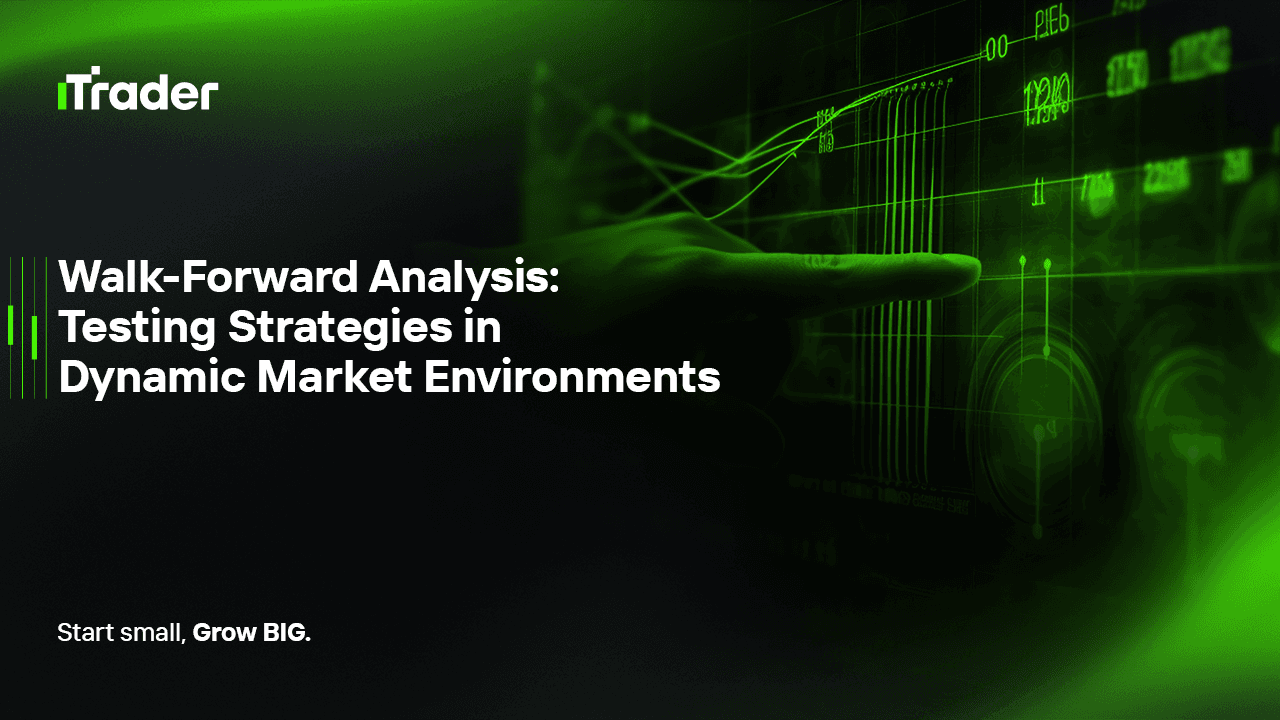2025-06-17
In the world of forex proprietary trading, success hinges not just on designing profitable strategies—but on proving they hold up when deployed in live, uncertain markets. A trading system might pass historical backtesting with flying colors, only to crumble in real-time due to market regime shifts, overfitting, or lack of adaptability.

Enter Walk-Forward Analysis (WFA)—a powerful, practical method for validating trading strategies under conditions that more closely resemble live trading. Unlike traditional backtesting, walk-forward testing evaluates a system's ability to adapt by testing it repeatedly on unseen data after every optimization phase.
In this comprehensive guide tailored for forex prop traders, we’ll explore:
Walk-Forward Analysis is a systematic method of testing a strategy’s performance by:
This creates a realistic simulation of what would happen if a trader regularly updated and adjusted a strategy based on the most recent performance and conditions.
Feature Traditional Backtesting Walk-Forward Analysis Data Usage Whole dataset at once Sliding windows (OOS and IS) Parameter Optimization Once Re-optimized at each step Robustness Test No Yes Adaptability Low High Realism Moderate High
WFA mimics the way prop traders operate—continually adjusting to a changing environment.
Here’s a step-by-step breakdown of how WFA is conducted:
Start with a complete, parameterized strategy. For example:
Make sure parameters are tunable.
Split your full dataset into multiple in-sample (IS) and out-of-sample (OOS) windows:
Let’s say we have 3 years of EUR/USD 1H data.
Use a suitable optimizer (grid search, genetic algorithm, Bayesian optimization) to find the best-performing parameters based on a fitness function (e.g., Sharpe Ratio, Expectancy, Calmar).
Apply the optimal parameters from IS to the OOS segment. Log the results:
Repeat for each walk-forward step. Combine all OOS results to create a Walk-Forward Equity Curve.
The final walk-forward equity curve represents how the strategy would perform if it were constantly optimized and updated over time.
A WFE between 50–100% is generally considered acceptable.
Forex prop trading demands:
WFA directly aligns with these goals:
Prop Trading Challenge | WFA Advantage
Strategy drift | Regular re-optimization
Overfitting | Validated via OOS
Performance decay | Forward step testing
Evaluation by firms | Objective robustness measure
Let’s walk through a simplified case study using Python and historical data.
Total Net Profit (OOS) +12.6%
Max Drawdown -4.1%
Sharpe (OOS) 1.36
WFE Avg 72%
Consistency Ratio 83%
Visually, the WFA equity curve showed consistent growth with acceptable drawdowns—ideal for a prop trading system.
To build this yourself, the key modules include:
import pandas as pd
import numpy as np
from backtesting import Backtest, Strategy
from sklearn.model_selection import ParameterGrid
Use a rolling loop to:
You can also integrate with:
Too many parameters or short IS window leads to curve-fitting. Use simple, interpretable rules.
Forex spreads, slippage, and commissions can drastically alter OOS performance. Always simulate realistic costs.
Dynamic markets require dynamic position sizing. Combine WFA with dynamic risk management for true robustness.
Too few walk-forward steps or short OOS periods reduce statistical confidence. Aim for at least 10+ OOS samples.
Practice
Use 6–12 month IS windows Balances adaptivity and sample size
OOS windows of 1–2 months Closely mimic forward periods
Dynamic risk sizing Adjust lot size to equity and volatility
Automate the process Save time and reduce human error
Re-optimize monthly or quarterly Reflects live trading logic
Maintain a Walk-Forward log For audit and future tuning
Walk-Forward Analysis is more than just a test method—it's a philosophy of adaptive trading. Prop traders must constantly evolve and update their strategies, not rely on static assumptions.
With WFA, you gain:
In today’s competitive forex prop trading space, raw returns aren’t enough. Firms—and markets—demand robustness, consistency, and adaptivity.
Walk-Forward Analysis provides a proven framework to meet that demand. By continually testing, tuning, and walking forward through time, traders ensure their systems don’t just survive, but thrive, in dynamic environments.
Whether you’re building your first algo or managing capital at scale, WFA should be a core part of your strategy development lifecycle.
Backtrader, bt, optuna, Pyfolio2025 Ай Трейдер Глобал ХХК | Компанийн бүртгэлийн дугаар: 15962
Ай Трейдер Глобал ХХК нь Комор улсын Анжуан арал дахь Мутсамуду хотын Хамчакод байрлалтай. Тус компани нь Коморын Үнэт Цаасны Хорооноос (Securities Commission of the Comoros) олгосон L15962/ITGL дугаартай тусгай зөвшөөрлийн хүрээнд үйл ажиллагаа явуулдаг.
Ай Трейдер Глобал ХХК нь “iTrader” нэрийн дор үйл ажиллагаа явуулдаг бөгөөд (Форекс) арилжааны үйл ажиллагаа явуулах эрхтэй. Компанийн лого, барааны тэмдэг, вэбсайт нь зөвхөн Ай Трейдер Глобал ХХК компанийн өмч юм.
Ай Трейдер Глобал ХХК -ийн охин компани болох : iTrader Global Pty Ltd, Австралийн компанийн бүртгэлийн дугаар (ACN): 686 857 198. Энэ компани нь Opheleo Holdings Pty Ltd компанийн албан ёсны төлөөлөгч бөгөөд Австралийн санхүүгийн үйлчилгээний төлөөлөгчийн дугаар: 001315037 -тай. Австралийн санхүүгийн үйлчилгээний лицензийн дугаар: 000224485 -тай Level 1, 256 Rundle St, Adelaide, SA 5000 хаягт байршдаг. Анхааруулга: Энэ байгууллага нь энэхүү вэбсайт дээр болон дамжуулан арилжаалагдаж буй санхүүгийн (арилжааны) хэрэгсэл нийлүүлэгч биш бөгөөд ямар нэгэн хариуцлага хүлээхгүй болно.
Эрсдэлийн сэрэмжлүүлэг: CFD арилжааны хөшүүргийн улмаас хөрөнгөө хурдан алдах өндөр эрсдэлтэй тул бүх хэрэглэгчдэд тохиромжгүй байдаг.
Фанд, CFD болон бусад өндөр xөшүүрэгтэй арилжаа нь хэрэглэгчээс нарийн төвөгтэй ойлголтуудын талаар тусгай мэдлэг шаарддаг. Хөшүүрэгтэй арилжаанд оролцогчдын 84.01% нь алдагдал хүлээдгийг судалгаанууд харуулдаг тул хөшүүрэгтэй арилжаанд орохоос өмнө хөрөнгөө алдах маш өндөр эрсдэлтэй болохыг анхаарна уу.
iTrader нь аливаа иргэн, хуулийн этгээдийн өмнө xөшүүрэгтэй арилжааны эрсдэл, алдагдал, бусад хохирлыг бүхэлд нь хариуцахгүй болохыг мэдэгдэж байна.
Энэхүү веб сайтын мэдээ, мэдээлэл нь зөвхөн мэдлэг түгээх зорилготой тул хэрэглэгч та бие даан шийдвэр гаргана уу.
Хязгаарлалт: iTrader нь вэбсайт болон үйлчилгээгээ тухайн орны хууль тогтоомж, дүрэм журмаар хориглосон орнуудад оршин суугчдад чиглүүлдэггүй. Хэрэв та энэхүү вэбсайтыг ашиглахыг хориглосон оронд байгаа бол вэбсайт болон үйлчилгээг ашиглахдаа тухайн орны хууль тогтоомжид нийцэж байгаа эсэхийг шалгах үүрэгтэй. iTrader нь вэбсайтынхаа мэдээлэл бүх оронд тохиромжтой эсэхийг баталгаажуулдаггүй.
Ай Трейдер Глобал ХХК нь зарим улс орны иргэдэд үйлчилгээ үзүүлэхээс татгалздаг болно. Жишээлбэл: АНУ, Орос, Бразил, Канада, Израйл, Иран.